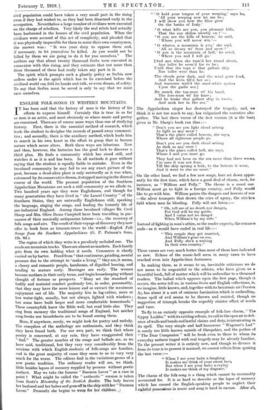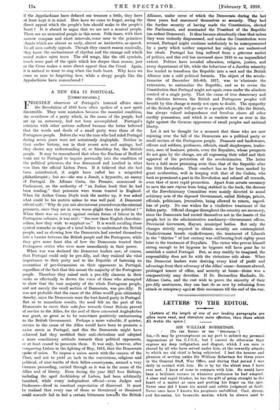ENGLISH FOLK-SONGS IN WESTERN MOUNTAINS.
IT has been said that the history of man is the history of his efforts to express himself. Certainly this is true in so far as man is an artist, and most obviously so where music and poetry are concerned. There are of course more ways than one of studying history. First, there is the essential method of research, which leads the student to decipher the records of passed-away communi- ties ; and secondly, there is the auxiliary method, which leads him to search in his own heart in the effort to grasp that in human nature which never alters. Both these ways are laborious. Now and then, however, the historian has the good luck to discover a third plan. He finds a community which has stood still, and watches it as it is and has been. In all methods it goes without saying that the student is equally liable to mistake. Even in the becalmed community he may fail to see any exact picture of the past, because a dead-alive place is only outwardly as it was when, entranced by its conservative dream, it stopped moving in the diurnal course of the world. The peasant population of the Southern Appalachian Mountains are such a still community as we allude to. Two hundred years ago they were Englishmen, and though for many generations they have lived in " the Laurel Country " of the Southern States, they are outwardly Englishmen still, speaking the language, singing the songs, and leading the leisurely life of pre-industrial England. Among these becalmed villages Mr. Cecil Sharp and Mrs. Olive Dame Campbell have been travelling in pur- suance of their musically antiquarian labour—i.e., the recovery of folk songs and airs. The result of their voyage of discovery they now offer in book form as treasure-trove to the world—English Folk Songs from the Southern Appalachians (G. P. Putnam's Sons, 128. 6d.).
The region of which they write is a peculiarly secluded one. The roads are mountain tracks. There are almost no markets. Each family gets from its own holding what it needs. Commerce is chiefly carried on by barter. Freed from " that continuous, grinding, mental pressure due to the attempt to 'make a living,"' they are, it seems, a cheery and romantic people, handsome, of dignified hearing, and tending to mature early. Marriages are early. The women become mothers in their early teens, and begin housekeeping without thought of fortune or prospects. " Many set the standard of bodily and material comfort perilously low, in order, presumably, that they may have the more leisure and so extract the maximum enjoyment out of life. The majority live in log-cabins, more or less water-tight, usually, but not always, lighted with windows ; but some have built larger and more comfortable homesteads." These countryfolk know the Bible well, but read little else. They sing from memory the traditional songs of England, but neither song-books nor broadsheets are to be found among them.
Here, if anywhere, surely, we might look for poetry and melody. The compilers of the anthology are enthusiasts, and they think they have found both. For our own part, we think tha't where poetry is concerned, at any rate, they have exaggerated their " find." The greater number of the songs and ballads are, as we have said, traditional, but they vary very considerably from the versions with which English students of folk-songs are familiar, and in the great majority of cases they seem to us to vary very much for the worse. The editors find in the variations germs of a new poetio tradition. The ordinary reader will see, we think, little besides lapses of memory supplied by persons without poetic instinct. May we take the famous " Daemon Lover " as a case in point ? What might be called the " authentic " version is taken from Scott's Minstrelsy of the Scottish Border. The lady leaves her husband and her babes and goes off in the ship with her " Daemon Lover." Presently she begins to weep for her children; " 0 hold your tongue of your weeping,' says he,
Of your weeping now let me be ; I will show you how the lilies grow On the banks of Italy.'
' 0 what hills are yon, yon pleasant hills, That the sun shines sweetly on ?
' 0 yon are the hills of heaven,' he said, Where you will never win.'- ` 0 whaten a mountain is yon,' she said, ` All so dreary wi' frost and snow ? ' ` 0 yon is the mountain of hell,' he cried, ` Where you and I will go.'
[And aye when she tum'd her round about, Aye taller he seem'd for to be ; Until that the tops o' that gallant ship Nae taller were than he.
The clouds grew dark, and the wind grew loud, And the levin fill'd her ee ;
And waesome wail'd the snaw-white sprites Upon the gurlie sea.] He strack the tap-mast wi his hand, The fore-mast wi' his knee ; And he brake that gallant ship in twain,
And sank her in the sea."
The Appalachian singer has destroyed the tragedy, and, we think it is not too much to say, has vulgarized the narrative alto- gether. The last three verses of the first version (it is the best) given in Mr. Sharp's book run thus :- "Don't you see yon light cloud arising As light as any snow ?
That's the place called heaven, she says, Where all righteous people go.
Don't you see yon dark cloud arising As dark as any crow ? That's the place called hell, she says, Where I and you must go.
They had not been on the sea more than three weeks, I'm sure it was not four,
Till the ship sprung a leak, to the bottom it went, And it went to rise no more."
On the other hand, we find a few new songs, here set down appar- ently for the first time, which have a good deal of charm, such, for instance, as " William and Polly." The theme is a usual one. William must go to fight in a foreign country, and Polly would like to go with him. William paints the dangers and horrors of war —the silver trumpets that drown the cries of agony, the stricken field where men lie bleeding. Polly will not listen :—
" Oh, tell me of no death nor danger,
For God will be my guide, And I value not no danger When. William's by my side."
Instead of fighting in man's attire, as the reader expects, tho romance ends—as it would have ended in real life :— " This couple they got married, And William's gone on sea, And Polly she's a-waiting In their own country."
These verses are very much better than most of those here indicated as new. Echoes of the music-hall seem in many cases to have reached even into Appalachian fastnesses.
In making these, as it seems to us, inevitable criticisms we do not mean to be ungrateful to 'the editors, who have given us a beautiful book, full of matter which will be unfamiliar to a thousand readers. The ballad which appears upon the first page, though it occurs, the notes tell us, in various Scots and English collections, is, we imagine, little known, and, together with its hexatonic air (Version A), has about it a sort of ominous fascination which is enthralling. Some spell of evil seems to be thrown and resisted, though no suggestion of triumph breaks the superbly sinister effect of words and tune.
To fly to an entirely opposite example of folk-lore charm, " The Gypsy Laddie," with its rattling refrain, its call to the open air in defi- ance of walls and bonds and lawful claims and duty, is intoxicating in its spell. The very simple and half-humorous " Wagoner's Lad" is surely too little known outside of Shropshire, and the pathos of " The Dear Companion " will be fresh even to those to whom its everyday sadness tinged with real tragedy may be already familiar. To the present writer it is entirely new, and though to divorce it from its tune is to present it maimed, we cannot refrain from quoting the last verse :-
" When I see your babe a-laughing It makes me think of your sweet face, But when I see your baba a-crying It makes me think of my disgrace."
The charm of the folk-song is a thing which cannot be reasonably accounted for. It is as hard to describe as the lapse of memory which has caused the English-speaking people to neglect their rightful possessions in music and song is hard to excuse. After all, if the Appalachians have defaced our treasure a little, they have at least kept it in mind. How have we come to forget, seeing the direct appeal which the people's lute should make to the people's heart It is absurd to argue that we are not a musical people. There are no unmusical people in this sense. Folk-tunes, with their narrow compass and short intervals, come near to the primitive chants which are almost as early, almost as instinctive, as speech. To all men melody appeals. Though they cannot reason musically, they know the enchantment of rhythm and the strange eall which sound makes upon tears. The old songs, like the old symbols, touch some part of the spirit which lies deeper than reason, just as the Cross makes a more direct appeal than the Creed. Again, it is natural to want to sing when the buds burst. Why have we come so near to forgetting how, while a sleepy people like the Appalachians have remembered



































 Previous page
Previous page